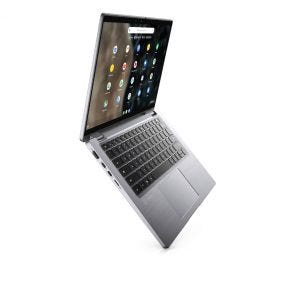Dell Takes Enterprise Chromebooks Up a Notch with Latitude 7410
The new Dell Chromebook is available as a clamshell or a 2-in-1.
August 17, 2020

Dell Technologies is taking its burgeoning line of enterprise Chromebooks upmarket with the release of its new Latitude 7410.
The new Chromebook, among several new PCs Dell introduced in May, started shipping last week. It comes nearly a year after Dell launched the first Chromebook in its commercial-grade Latitude line. It was the first commercial Chromebook designed with Google’s Chrome Enterprise.

You can get the Latitude 7410, the new enterprise Chromebook from Dell, as a clamshell or foldable 2-in-1 device (seen here).
Last year’s inaugural Chromebooks were based on the midtier 5000-Series line. The new Latitude 7410 comes from Dell’s premium 7000-Series. The new 14-inch Chromebook sports a sharper design and is available with an optional 4K display.
Instead of offering two separate models, Dell’s new Chromebook is available either as a clamshell or foldable 2-in-1 device. Having both form factors in one model brings more consistency than last year’s Chromebooks, which the company offered as two separate models.
Partners can offer customers the Latitude Chromebook 7410 configured as a 14-inch clamshell or a two-in-one, said Meghana Patwardhan, VP of Dell’s Latitude and commercial mobility products.
“It’s the same model number, just a different LCD screen for your end users,” Patwardhan said. “They can offer a device configured the way people want to work without having to manage multiple different products.”
Dell is emphasizing that the Latitude 7410 is the first enterprise Chromebook with a 4K panel. It also offers a low blue light display filter. Furthermore, the company claims the new Chromebook has 21 hours of battery life. It supports Wi-Fi 6 wireless communications and is available for LTE connectivity.
The Latitude 7410 comes with various Intel 10th Generation Core processors, up to an i7 CPU. It also supports Project Athena, Intel’s blueprint for offering modern mobile PC experiences. Launched last year, Intel began rolled the first Chromebooks based on Project Athena started to appear at January’s Consumer Electronics Show (CES).
More Enterprise Chromebook Options
Dell’s new Chromebook will compete with the forthcoming HP Elite c1030 Chromebook Enterprise, which HP also launched in May. The HP Elite c1030 is one of several enterprise Chromebooks HP launched at the time. As the premium version, the Elite c1030, a 2-in-1 Chromebook, is HP’s first based on Intel Project Athena.
While Chromebooks have gained large share in price-sensitive markets such as education, Google has begun aiming at enterprise users. Google signaled that effort on 2018 by hiring former Apple and HP exec John Solomon, tapped to oversee Chrome OS. Industry analyst Charles King of Pund-IT noted that Google “tasked him with evolving Chrome into a computing platform thoroughly suited for the needs of modern businesses, developers and OEMs.”
Over the past year, demand has increased, Swanson noted in a recent post.
“As we expanded a truly modern operating system over these past two years, we saw increased demand and confirmed we were onto something for the longer term,” he wrote. “Enterprises are accelerating the move of applications and workloads to the cloud, adding resiliency to the existing benefits of flexibility, agility collaboration and cost.”
The shift to more remote computing because of COVID-19 has further lifted that growth, Swanson noted. In the U.S., Google’s Chromebook unit sales grew 109% in the first quarter year-over-year, with commercial systems growth topping 155%.
Dell’s Latitude 7410 Chromebook Enterprise starts at $1,299 for a Core i5 model. Dell is readying a model with i3 processors starting at $1,099.
Read more about:
VARs/SIsAbout the Author(s)
You May Also Like


